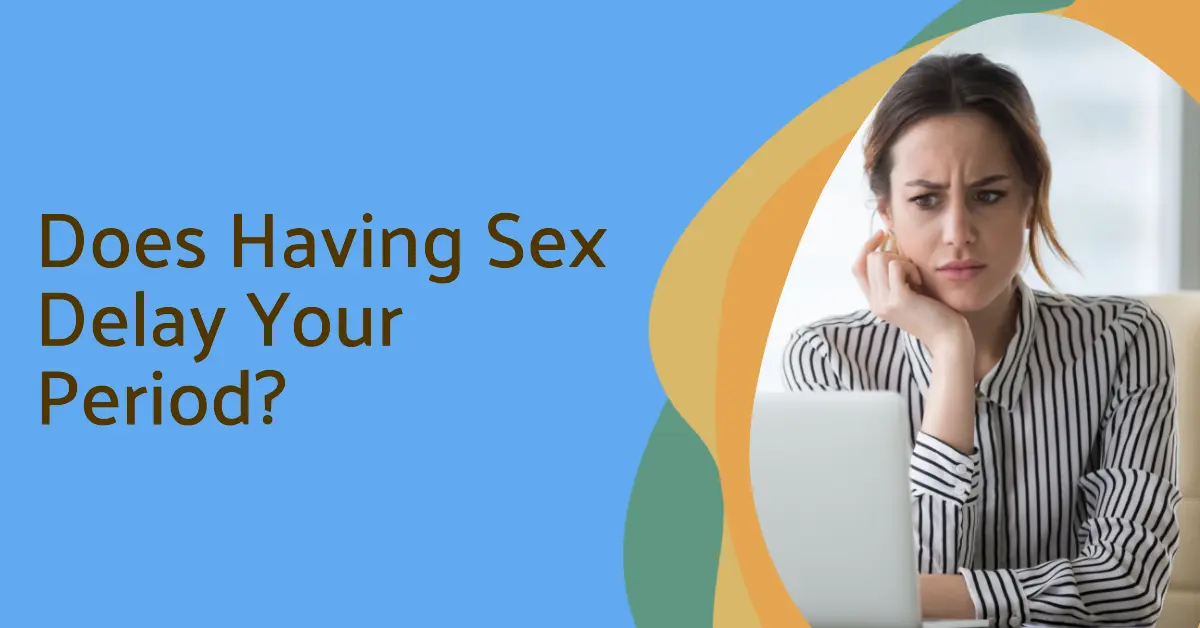
Are you eagerly waiting for that time of the month to come? Or are you dreading it like a vampire avoids garlic? Either way, if you’ve been wondering does having sex delay your period, then you’ve come to the right place!
There are all sorts of beliefs and myths about the connection between sexual activity and menstruation. Some people think that having sex can cause your period to come early, while others believe that it can delay your period for days on end.
In this article, we’ll dive deep into the science behind menstruation and ovulation, and explore the various factors that can affect the menstrual cycle. We’ll also answer the burning question on everyone’s minds: Can sex really delay your period?
So, sit back, relax, and get ready to learn all about the ins and outs of your menstrual cycle. And who knows, maybe by the end of this article, you’ll even have a newfound appreciation for your menstrual flow.
Related: Cervical Changes: Early Pregnancy vs. Pre-period
The Science of Menstruation and Ovulation
Before we get into the nitty-gritty of sex and periods, let’s first take a quick trip down memory lane and revisit what happens during the menstrual cycle.
The menstrual cycle is a complex process that is controlled by hormones in the body. It starts on the first day of your period, when the lining of the uterus is shed, and lasts for an average of 28 days (though it can vary from person to person).
Around day 14 of the menstrual cycle, ovulation occurs. This is when the ovary releases an egg that travels down the fallopian tube, ready to be fertilized by sperm. If the egg is not fertilized, it will be shed along with the uterine lining during the next period.
Related: How to Get Birth Control Online? (Detailed Review 2023)
Factors That Can Affect the Menstrual Cycle
Now that we’ve refreshed our memories on the menstrual cycle, let’s talk about some of the factors that can affect it. There are a lot of things (other than pregnancy) that can influence the timing and duration of your period, including:
Young Age
It’s common for many young women to experience delays and irregularities in their menstrual cycles due to their hormones still being in the process of developing and fine-tuning themselves. This may result in a delay of up to three months or irregular periods. Don’t worry, though – as time goes by, your body will mature, and your menstrual cycle will eventually become more regular. However, for some women, irregular periods may persist well into their adult years.
Hormonal Imbalance
Hormonal imbalances can occur due to various reasons, such as stress, changes in weight, medication, or underlying medical conditions. These imbalances can affect the levels of hormones responsible for regulating your menstrual cycle, such as estrogen and progesterone, resulting in a delay or irregularity in your period
Stress
Stress, oh sweet stress. Our bodies have a funny way of reacting to it, and our menstrual cycle is no exception. Hormones related to the fight-or-flight mode can wreak havoc on our cycle, leading to missed periods or delayed ovulation. Plus, stress is the number one cause of infertility, so it’s important to take care of our mental health as well as our physical health.
Prescription Birth Control
If you’re on the pill or other hormonal birth control, it’s possible that your period may be delayed or even absent altogether. Long-term use of birth control can also cause the uterine lining to thin out, leading to less bleeding or no period at all.
Recent Sickness
If you’ve been under the weather lately, your body may be too busy fighting off sickness to worry about menstruation. Medications prescribed to treat an illness can also delay your period, so keep that in mind if you notice a delay after taking medication.
Over-Exercising
Exercise is great for our bodies, but overdoing it can lead to amenorrhea or the absence of a monthly period. The stress hormone cortisol can suppress our fertility hormones, preventing ovulation and menstruation. So take it easy on the high-intensity workouts and make sure you’re giving your body the rest it needs.
Sudden Weight Changes
If you’ve experienced a sudden change in weight, either gain or loss, your body may be under stress. Large fluctuations in weight can cause cortisol levels to rise, affecting ovulation and menstruation. It’s important to maintain a healthy weight and lifestyle for overall well-being.
Eating Disorders
Eating disorders can wreak havoc on our bodies, leading to missed periods or irregular cycles. When our bodies aren’t getting proper nutrition, it prioritizes survival over reproduction, leading to missed ovulation and menstruation.
Premature Menopause
Did you know that at birth, you already have a whopping 1-3 million eggs? That’s right! But don’t get too excited because unfortunately, you lose some of these eggs during every menstrual cycle. As you age and continue to lose more eggs, the quality of the remaining ones may decline, leading to a natural cessation of ovulation – this is what we call menopause. But here’s the kicker – if you experience menopause before the age of 40, also known as premature menopause, you will no longer have periods afterward. So, make sure to treasure your menstrual cycle while it lasts, and take good care of your reproductive health to prolong its natural lifespan.
Polycystic Ovary Syndrome (PCOS)
Women with Polycystic Ovary Syndrome (PCOS) often experience irregular menstrual cycles due to high androgen levels, which prevent regular ovulation and menstruation.
Uterine Fibroids
Uterine fibroids, non-cancerous tumors that are common in women worldwide, can cause heavy bleeding, irregular periods, and missed periods in some women.
Primary Ovarian Insufficiency (POI)
In rare cases, women may experience Primary Ovarian Insufficiency (POI), which causes late, missed, or intermittent periods. But don’t fret, the risk of POI in women under 40 is only 1%, so it’s unlikely to be the cause of your late period.
If your period is late for more than three cycles, it’s time to seek medical advice. Don’t be afraid to talk to your doctor about any irregularities in your menstrual cycle. After all, taking care of our bodies is important for a healthy, happy life.
Related: Menorrhagia Causes, Symptoms and Risk Factors
Does Having Sex Delay Your Period?
Now, onto the question you’ve been waiting for: Does having sex delay your period?
It’s possible that sexual activity could delay your period temporarily, as it can cause the cervix to open slightly and allow for more blood flow. However, this is unlikely to have a significant impact on the timing of your period.
It’s also important to note that there are many other factors that can affect the menstrual cycle, as we discussed earlier. So, if you’re experiencing a delay in your period and you’ve been sexually active, it’s not necessarily the sex that is causing the delay.
Related: Is It Safe to Have Sex During Your Period? Tips, Benefits, and Side Effects
Can your Period be Delayed if you have Sex 2 Days before it?
Not quite. In most cases, minor fluctuations in the duration of your menstrual cycle are not related to sexual activity. It is not a problem if your periods are delayed. Sexual activity won’t stop your period from coming on schedule. Pregnancy may be the reason for the delay in your menstruation. If your periods are a week late, you should perform a pregnancy test.
How much Delay is Normal in Periods?
Depending on your regular cycle, your period should begin between 21 and 35 days after your last period, barring any known conditions that may impact it. Regular intervals might change. If your typical cycle lasts 28 days and you are on day 29 without your period, your period is considered late.
I had Sex on my Period and it Stopped the Next Day
It is possible for sexual activity to temporarily disrupt your menstrual flow. This is because the contractions of the uterus during orgasm can expel menstrual blood more quickly than usual. However, it is unlikely for sex to completely stop your period after only one day of bleeding.
How to get Periods after Sex?
If you achieve an orgasm during sex and are close to your period’s start date, sex may help your period start. There can be another cause if you experience bleeding after having sex. You may bleed after intercourse for a variety of causes, including infections, vaginal rips, ovulation, and cancer.
I had Protected Sex but my Period is Late
Your period won’t be delayed by having protected sex or even intercourse, for that matter. As of right now, there is nothing that can impact your periods, unless you are pregnant or have another condition that would cause a delay.
I had Sex a Week before my Period and Now i’m Late
Only if you become pregnant may sex cause a delay in your menstruation. This is due to the fact that you do not have your period when pregnant. However, variations in your period from month to month are common and can be brought on by a variety of factors.
Conclusion
In conclusion, the question of does having sex delay your period is complex and multifactorial. While there is some anecdotal evidence to suggest that sexual activity can delay your period, there is no clear-cut answer. There are many other factors that can affect the timing and duration of your period, including stress, weight changes, and changes in routine.
If you’re experiencing a delay in your period and you’re concerned, it’s always a good idea to speak with your healthcare provider. They can help you determine the underlying cause of the delay and provide appropriate treatment if needed.
In the meantime, try not to stress too much about your period. It’s a natural and normal part of life, and there are plenty of ways to manage any discomfort or inconvenience that comes along with it. And who knows, maybe with a little knowledge and insight, you’ll even come to appreciate the unique rhythms of your menstrual cycle.
Related: Making Love, Not War: 10 Comfortable Pregnancy Sex Positions
Frequently Asked Questions
Can Stress Delay your Period?
Yes, stress can have a significant impact on the menstrual cycle and lead to changes in the timing and duration of your period.
Can Weight Loss or Gain affect your Period?
Yes, significant weight changes can affect the menstrual cycle. When body fat levels drop too low, the menstrual cycle can become irregular or stop altogether.
Can Traveling across Time Zones affect your Period?
Yes, changes in routine, such as traveling across time zones, can disrupt the body’s natural rhythms, including the menstrual cycle.
Can having Sex Delay your Period?
There is no clear-cut answer as to whether sex can delay your period, as the relationship between sexual activity and the menstrual cycle is complex and multifactorial.
Can having Sex cause your Period to come Early?
There is no clear-cut answer to this question. While some anecdotal evidence suggests that sexual activity can cause the uterus to contract and bring on an early period, there is no scientific proof to back up this claim.
Can using Birth Control Pills Delay your Period?
Yes, using birth control pills can regulate the menstrual cycle and delay the onset of your period. This is because the hormones in the pills suppress ovulation and can alter the timing of your menstrual cycle.






